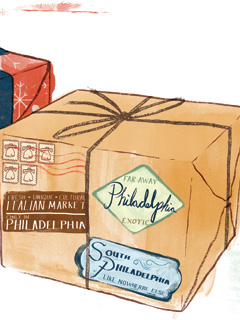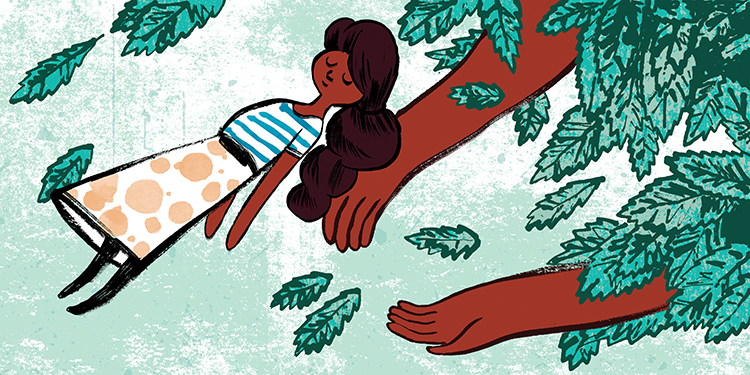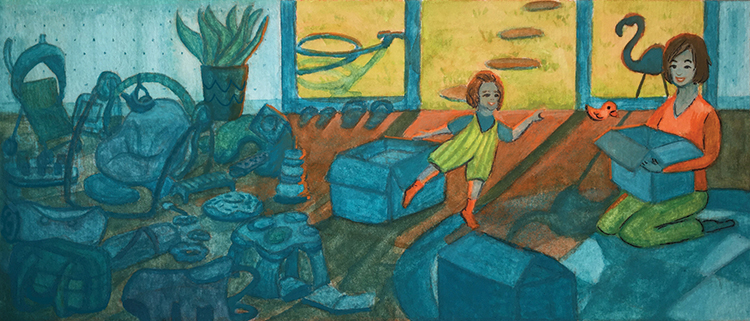 story by Daniel McLaughlinDuring the holidays, “It’s the thought that counts” is a sentiment lost on the McLaughlin clan. We’re an Irish family with five siblings and many more nieces and nephews, so the gift-giving gets competitive—it’s the MMA Championship of generosity. We’re always attempting to outdo each other, overlooking our debt/income ratio for the satisfaction of stupefying each other with gratitude.
story by Daniel McLaughlinDuring the holidays, “It’s the thought that counts” is a sentiment lost on the McLaughlin clan. We’re an Irish family with five siblings and many more nieces and nephews, so the gift-giving gets competitive—it’s the MMA Championship of generosity. We’re always attempting to outdo each other, overlooking our debt/income ratio for the satisfaction of stupefying each other with gratitude.
In the days when my travel budget was a bit more flush, I had a distinct advantage. I was a modern-day Magi, bearing exotic gifts from far-off lands. Past offerings included custom distilled Scotch from Edinburgh, candles in the shape of Stalin’s head from the Museum of Communism in Prague and bottles of wine from Stellenbosch in South Africa. Just try and top that with your Banana Republic gift card.
Now that stupid adulthood has set in—and with it the responsibilities of home ownership, student loans and self-employment—my wings have been clipped, and I’m faced with a humbling holiday reality. But, after years of MVP status, I just can’t abide the thought of gifting someone a sweater set.
The tokens from my travels were literally carried on my back from across the ocean. They were precious treasures to me, signifying a time, a place and an experience, and when I presented them to a loved one, I felt I was sharing all those things with them, too.
Plus, in our age of globalism, almost everything lining retail shelves comes from afar. (That said, distance-traveled loses its luster when the item is packed in a sea box and crated to your local big box store.) Things that used to be a defining product in one specific part of the world are now available down the street. With little effort, you can buy chai from India, cheese from France, threads from Saville Row, glass from Venice and beer from Belgium.
Sometimes all you need is a change of perspective. This year, as part of a grand experiment—dubbed the Thirteenth Diet—I immersed myself in 12 different diets (vegan, raw, minimum wage) for 30 days at a time. In September, I took on a local challenge—I could only eat foods sourced from within a 150-mile radius of Philadelphia. Every ingredient had to be considered. For example, if a beer was made in Downingtown, PA, but the malt was from Canada, it was off the list.
During this experiment, I realized that local products are exotic. In this era of cross-culturalism and international trade, it’s easy to lose sight of just how little of what we buy is made where we live. Consider your morning cup of coffee, the T-shirt you’re wearing, or the bottle of water on your desk. We rarely stop to consider that an everyday product could have traveled 3,000 miles to get to us.
Before this project, I never paid much attention to where my food came from. Now that I’ve awakened that sense, I can’t turn it off. I check every label, and think twice before committing to purchasing something from Malaysia when it could have been grown in my own backyard. I take pride in supporting local artisans, farmers and growers, and the thought of giving my money to a neighbor—with a name, a face and an address—feels so much better than funding some anonymous conglomerate across the sea.
So, this year I’m looking forward to giving gifts that have the exotic provenance of my hometown. The objects will still be vessels for imparting my experiences, still carry the stories of the people I’ve met and the things I’ve enjoyed. I’m excited to show off the counter-global foods and wares that make Philadelphia unique. When you put some thought into the source, you’re giving a gift that benefits more than just its recipient.
Turns out it is the thought that counts.
For more on McLaughlin’s project, visit thethirteenthdiet.com




